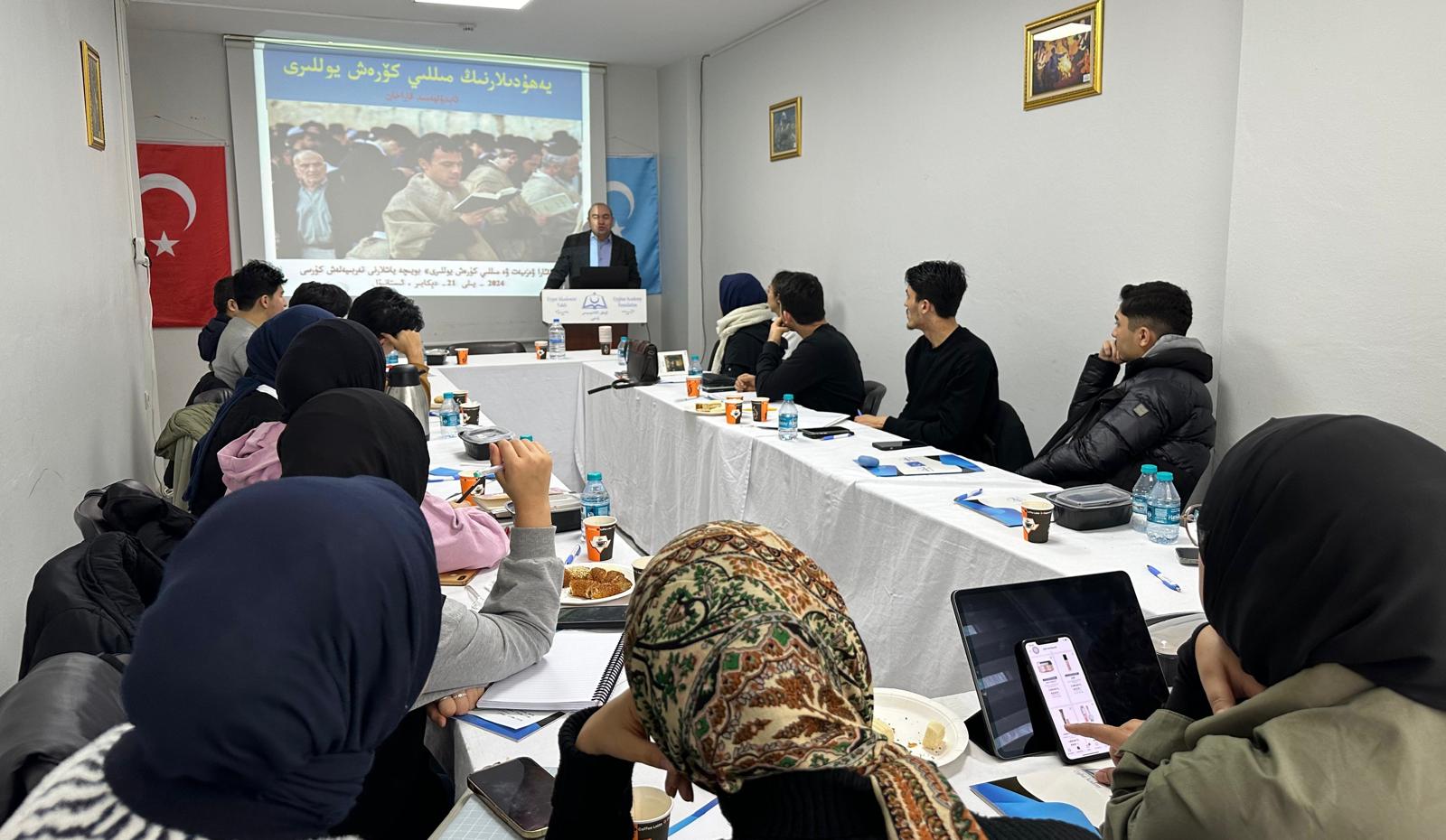The third session of the long-term training program titled ‘International Conjuncture and National Struggle Methods,’ designed to develop leading individuals from Uyghur youth for the East Turkistan struggle, was held at the Uyghur Academy’s Istanbul Sefaköy office on December 21-22, 2024.
During the two-day program, researchers and activists including Prof. Süleyman Doğan, Abdürreşit Abdülhemid, Abdülhamit Karahan, Tahir Hamut İzgil, Dr. Mehmet Emin Begtimur, Memet Tohti Atavulla, and Muhammet Emin Bektur addressed important issues concerning Uyghurs and youth. Eighteen Uyghur students studying at various universities across Turkey participated in the training.

The training session began with a robotics lesson by Muhammet Emin Bektur, founder of Uyghur STEM. The lesson provided comprehensive information about robots. Participants were taught various topics through practical examples, including robot types and components (hardware and software), operating principles, kinematics and motion equations, mathematical and physical principles, and the role of artificial intelligence and machine learning in the ‘sense-think-act’ cycle of robots’ mechanisms for perceiving, processing, and decision-making about the external world.
In the second lesson, Abdülhamit Karahan, Secretary General of the Uyghur Academy, Vice Chairman of the World Uyghur Congress Executive Committee, and Chairman of the Uyghur Academy Foundation, taught about “Jewish National Struggle Methods.” Karahan first introduced the Jewish people, summarizing their historical journey of living away from their homeland for 1,800 years until establishing their own state in 1947. He explained various factors that led to their successful struggle with examples.

Karahan emphasized that the Uyghurs, who have lived under Chinese occupation and persecution for 130 years, could also establish their own state one day and stressed the importance of learning from the struggle experiences of nations that succeeded in overcoming oppression and establishing their states.
In the third lesson, Dr. Mehmet Emin Begtimur, a faculty member at Istanbul Gelişim University, continued his lecture on “Basic Information About Effective Communication” for Uyghur youth. The seminar covered the fundamental elements of effective communication in detail, particularly emphasizing body language, tone of voice, and presentation techniques.

Dr. Begtimur emphasized that personal stories are much more effective in conveying the Uyghur issue to the world and provided important tips on this matter. He also gave each student an opportunity to speak, evaluating their strengths and weaknesses in public speaking and offering suggestions.
On Sunday morning, December 22, renowned poet, director, and writer Tahir Hamut İzgil had a discussion with Uyghur youth titled “How Should We Understand Recent Events in Uyghur History?”

İzgil emphasized the importance of understanding that East Turkistan has belonged to the Uyghur people since ancient times and learning from history. He stated, “If the Uyghur people don’t learn from history, this genocide will continue to repeat itself.”
Later that morning, Abdüreşit Abdülhemid, Vice President of the World Uyghur Congress and Chairman of the World Uyghur Congress Foundation, gave a lecture on “East Turkistan National Struggle in the Diaspora.” Mr. Abdülhemid detailed the history and processes of the Uyghur national struggle from the 1920s and 1930s to the present. He focused on the struggles of Uyghur leaders in the diaspora and the stages of Uyghurs’ quest for independence in the diaspora.

He also provided information about the establishment process of the World Uyghur Congress, its work to date, and steps taken for international recognition of the Uyghur issue. At the end of his speech, Abdülhemid emphasized that young people should develop as leading individuals in the national struggle and take on important roles in securing East Turkistan’s independence with sincerity, sacrifice, and competence.
In the afternoon, independent researcher Memettohti Atavulla gave a presentation titled “China’s State Security Policy and Uyghur Genocide.” He explained the factors influencing the changes in China’s security policy since the end of the Qing Empire. These factors included changes in Chinese rule, international conjunctures, and the evolution of China’s relationships with the Soviet Union and the United States over time. Atavulla focused on how these transformations took shape during different power administrations such as the Mao, Deng, and Xi periods, and explained the unique characteristics each period added to security policy.

Additionally, Atavulla detailed China’s policies toward Uyghurs, particularly emphasizing the genocide policies implemented in recent years. He analyzed how these policies align with China’s national security strategies and how systematic practices targeting the Uyghur population are connected to China’s goals of becoming a global power.
In the final lesson of the two-day program, Prof. Dr. Süleyman Doğan from Yıldız Technical University’s Sociology Department gave a lecture titled “From Masnavi to Modern Education: Personal Development.” Doğan explained the three main purposes of education: understanding the past, living well in the present, and preparing for the future. He also noted that classical works like Masnavi are not just literary sources but also have pedagogical and healing value. He emphasized that the more than 300 poetic stories in Masnavi provide a rich resource for bibliotherapy (book therapy). Doğan pointed out that while the dominance of information and communication technologies has increased in today’s world, what truly matters is how this power is used, stating, “In our age where knowledge is the greatest power, the critical point is being able to use this power in harmony with moral values.”

In this context, Doğan explained that Rumi’s saying “I was raw, I became cooked, I burned” concisely explains the stages in human development journey, and stated, “In life’s adventure, it is vitally important for each individual to deepen in their field, adhere to ethical values, and understand and convey their value judgments correctly.” He also touched on the importance of combining the wisdom teachings in our classical works with modern educational techniques.
The third session of this training program was highly productive with active participation from youth and question-answer sessions following the lessons. The next sessions will continue in Istanbul, occurring one weekend each month.
Source: Uygur News


